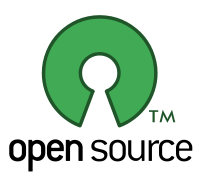- Open Source Initiative
-
Open Source Initiative 
standard OSI logoFormation February 1998 Headquarters San Francisco, CA President Michael Tiemann Website opensource.org The Open Source Initiative (OSI) is an organization dedicated to promoting open source software.
The organization was founded in February 1998, by Bruce Perens and Eric S. Raymond, prompted by Netscape Communications Corporation publishing the source code for its flagship Netscape Communicator product. Later, in August 1998 the organization added a board of directors.
Raymond was president from its founding until February 2005. The current president is Michael Tiemann.
Contents
Relations with the free software movement
Although born from the same history of Unix, Internet free software, and the hacker culture as the free software movement launched by Richard Stallman and his Free Software Foundation, the Open Source Initiative was formed and chose the term open source, in Michael Tiemann's words, to "dump the moralizing and confrontational attitude that had been associated with 'free software' in the past and sell the idea strictly on the same pragmatic, business-case grounds that had motivated Netscape."[1]
Stallman counter-charges that OSI's pragmatic focus on a model for software development and marketing ignores what he considers to be the central "ethical imperative" and the focus on "freedom" that underlies free software, as he defines it, and blurs the distinction with semi-free or wholly proprietary software.[2] To Stallman, the important, fundamental difference is philosophical. Nevertheless, he describes his free software movement and the Open Source Initiative as separate camps within the same free software community. According to Stallman, "We disagree with the open source camp on the basic goals and values, but their views and ours lead in many cases to the same practical behavior—such as developing free software. As a result, people from the free software movement and the open source camp often work together on practical projects such as software development."[2]
History
The movement was launched in 1998 by Jon "maddog" Hall, Larry Augustin, Eric S. Raymond, Bruce Perens, and others.[3][4]
The group adopted the Open Source Definition for open-source software, based on the Debian Free Software Guidelines. They also established the Open Source Initiative (OSI) as a steward organization for the movement. However, they were unsuccessful in their attempt to secure a trademark for 'open source' to control the use of the term[5]. Despite this, the OSI developed considerable influence[citation needed] in the corporate sphere and has been able to hold abuse of the term to a tolerable minimum. With the Free Software Foundation (FSF), it has become one of the hacker community's two principal advocacy organizations[citation needed].
The early period of the open-source movement coincided with and partly drove[original research?] the dot-com boom of 1998─2000, and saw a large growth in the popularity of Linux and the formation of many open-source-friendly companies[citation needed]. The movement also caught the attention of the mainstream software industry, leading to open-source software offerings by established software companies such as Corel (Corel Linux), Sun Microsystems (OpenOffice.org), and IBM (OpenAFS)[citation needed]. By the time the dot-com boom busted in 2001, many of the early hopes of open-source advocates had already borne fruit, and the movement continued from strength to strength in the cost-cutting climate of the 2001─2003 recession[original research?].
In 2009, the organization was temporarily suspended from operation as a California corporation, apparently in response to a complaint concerning tax paperwork from earlier years.[6][clarification needed] Its current status is "Active".[7]
Board members
The current Open Source Initiative board is [8]:
- Karl Fogel
- Mike Godwin
- Harshad Gune
- Jim Jagielski
- Fabio Kon
- Martin Michlmayr
- Andrew C. Oliver[9]
- Simon Phipps
- Alolita Sharma
- Michael Tiemann
- Tony Wasserman
Past board members include:
- L. Peter Deutsch
- Brian Behlendorf
- Guido van Rossum
- Bruce Perens
- Raj Mathur
- Ian Murdock
- Chip Salzenberg
- Tim Sailer
- Eric S. Raymond
- Chris DiBona
- Bruno Souza[9]
- Sanjiva Weerawarana
- Joi Ito
- Matt Asay
- Ken Coar
- Rishab Aiyer Ghosh
- Nnenna Nwakanma
- Russ Nelson
- Danese Cooper
- IGOS
- MyOSS - Malaysia
- Ma3bar - Arab Region
- Jordan Open Source Association
- Fueling FOSS in Sri Lanka
See also
- Free Software Foundation
- Digital freedom
- Open Source Definition
- Commons-based peer production - economic model for organizing projects without leaders or financial compensation
- Comparison of open source and closed source
- Open source governance - use of open source principles to transform human social governance
- Techno-progressivism - a stance of active support for the convergence of technological change and social progress
- Open source movement- The evolution and evidence of the open source ideology
References
- ^ Tiemann, Michael (2006-09-19). "History of the OSI". Open Source Initiative. http://www.opensource.org/history. Retrieved 2009-04-25.
- ^ a b Stallman, Richard (2009-04-21). "Why 'Open Source' Misses the Point of Free Software". Free Software Foundation. http://www.gnu.org/philosophy/free-software-for-freedom.html. Retrieved 2009-04-25.
- ^ History of the OSI
- ^ A Look Back at 10 Years of OSI
- ^ http://opensource2.usrbinruby.net/pressreleases/certified-open-source.html%7Ctitle=OSI Announcement of losing 'open source' trademark
- ^ http://blogs.the451group.com/opensource/2009/10/06/the-open-source-initiatives-corporate-status-is-suspended-a-caos-theory-qa/
- ^ "Use Search Type=Corporation Name and search for "Open Source Initiative"". http://kepler.sos.ca.gov/. Retrieved 2010-02-24.
- ^ 2011 OSI board elections
- ^ a b 2009 OSI Board Elections held in April
External links
Categories:- Free and open source software organizations
- Organizations established in 1998
- Advocacy groups
Wikimedia Foundation. 2010.
